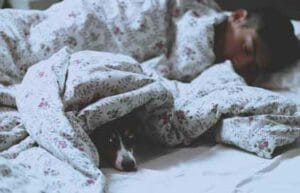How the COVID-19 Lockdown Has Changed Your Sleep Habits, for Better and for Worse
You had trouble with sleep before COVID-19.
And now it’s even worse.
I’ve relaxed into a widely variable sleep schedule too over the past year, and I am a sleep expert who should know better.
But so many factors have been distressing us since March 2020. The good news is that many of us have the opportunity to sleep more during the COVID-19 pandemic, but the bad news is that increased time in bed may not be correlated with quality sleep.
Some people have fewer commitments and less travel and workplace commuting, but these gains may be negated by anxiety and insomnia related to job insecurity, fear of infection, or delayed access to the vaccine.
We are overanxious and underslept due to restrictions on where we can go and what we can do. We have messed up travel and vacation plans. We have to deal with closures and restrictions in where we shop, go to school, exercise, and socialize. Maybe we have too much variability in the timing of our meals, or we have relaxed into excessive digital media exposure.
Here’s more on how the COVID-19 Lockdown Has Affected Our Sleep
Data is building on how the pandemic has taken a toll on our sleep.
- Deep sleep restores mechanisms that regulate our emotions. A sleepless night can trigger up to a 30% rise in anxiety levels.
- Sleep is important for immune function against viruses, and it also helps to regulate glucose metabolism, appetite, and weight gain. All of these influence the risk factors for COVID-19: diabetes, obesity, and sleep apnea.
- About 30% say they are getting more sleep, but feeling less rested.
- Those around us are all suffering too. Our police are stressed, our healthcare workers are exhausted, our family members are impatient and grumpy.
- Even our dreaming has been affected, as sleeping later allows more early morning REM sleep, the stage where we dream most deeply.
- Some of us are indoors too much, but we need natural light and Vitamin D to activate key immune factors to fight viruses.
Sounds serious, right?
But before I get to some solutions about how sleep could be a key to ending this pandemic, let me ask you –– what is happening for you?
- Has your sleep quality declined?
- Do you have a shifted circadian cycle (maybe later to bed, later to rise)?
- Is your sleep latency disturbed (how long it takes you to fall asleep)?
- Has your sleep efficiency declined (you are tucked in bed, but are you sleeping soundly, or actually awake and anxious?)
No matter which characteristics of sleep have changed for you, the solutions are similar.
Here are 3 Ways to Boost Your Sleep Quality during the COVID-19 Pandemic
- Exercise outdoors in natural light every day.
This is a natural boost for fatigue or sadness, and also activates Vitamin D production to help with autoimmunity. - Use regular rituals.
Find a consistent rhythm by setting regular meal times, sleep times, and wake times, and sticking to them. - Kick harmful habits.
Commit to stop napping or consuming caffeine after 2 PM. This will help you get to bed earlier and get to sleep quickly.
Think of it this way –– the sooner you choose one tip that is the easiest for you, and commit to it every day, the faster you’ll recover from this whole pandemic experience.
—
Enjoyed this post? Let us know. Here’s more:
Plan an awesome event and find great speakers on sleep and productivity at: https://www.mcptalent.com/blog/
For more blogs to help plan to improve your sleep and energy, visit Dr. Chris Carruthers
Editor’s Closing Note:
Dr. Chris Carruthers is a sleep health champion providing information and skills for smart action to overcome insomnia and conquer fatigue. With a lifetime career in healthcare and recovered after 7.5 years of Chronic Fatigue Syndrome and Fibromyalgia, Chris shares her sleep strategies through speaking, coaching and consulting.












